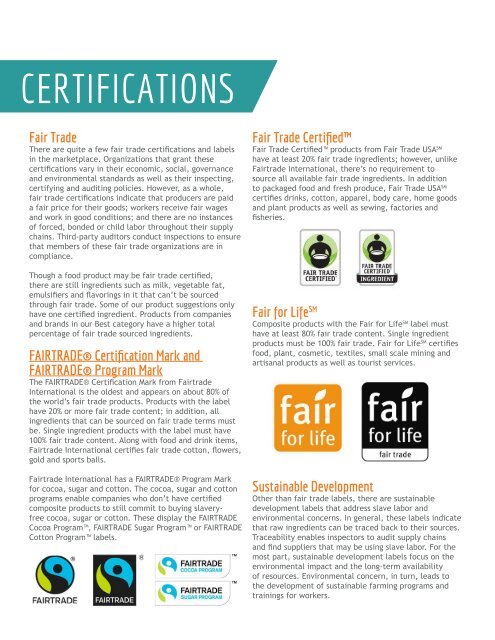SLAVE FREE
slavefreeguide_011916
slavefreeguide_011916
You also want an ePaper? Increase the reach of your titles
YUMPU automatically turns print PDFs into web optimized ePapers that Google loves.
CERTIFICATIONS<br />
Fair Trade<br />
There are quite a few fair trade certifications and labels<br />
in the marketplace. Organizations that grant these<br />
certifications vary in their economic, social, governance<br />
and environmental standards as well as their inspecting,<br />
certifying and auditing policies. However, as a whole,<br />
fair trade certifications indicate that producers are paid<br />
a fair price for their goods; workers receive fair wages<br />
and work in good conditions; and there are no instances<br />
of forced, bonded or child labor throughout their supply<br />
chains. Third-party auditors conduct inspections to ensure<br />
that members of these fair trade organizations are in<br />
compliance.<br />
Though a food product may be fair trade certified,<br />
there are still ingredients such as milk, vegetable fat,<br />
emulsifiers and flavorings in it that can’t be sourced<br />
through fair trade. Some of our product suggestions only<br />
have one certified ingredient. Products from companies<br />
and brands in our Best category have a higher total<br />
percentage of fair trade sourced ingredients.<br />
FAIRTRADE® Certification Mark and<br />
FAIRTRADE® Program Mark<br />
The FAIRTRADE® Certification Mark from Fairtrade<br />
International is the oldest and appears on about 80% of<br />
the world’s fair trade products. Products with the label<br />
have 20% or more fair trade content; in addition, all<br />
ingredients that can be sourced on fair trade terms must<br />
be. Single ingredient products with the label must have<br />
100% fair trade content. Along with food and drink items,<br />
Fairtrade International certifies fair trade cotton, flowers,<br />
gold and sports balls.<br />
Fairtrade International has a FAIRTRADE® Program Mark<br />
for cocoa, sugar and cotton. The cocoa, sugar and cotton<br />
programs enable companies who don’t have certified<br />
composite products to still commit to buying slaveryfree<br />
cocoa, sugar or cotton. These display the FAIRTRADE<br />
Cocoa Program, FAIRTRADE Sugar Program or FAIRTRADE<br />
Cotton Program labels.<br />
Fair Trade Certified<br />
Fair Trade Certified products from Fair Trade USA SM<br />
have at least 20% fair trade ingredients; however, unlike<br />
Fairtrade International, there’s no requirement to<br />
source all available fair trade ingredients. In addition<br />
to packaged food and fresh produce, Fair Trade USA SM<br />
certifies drinks, cotton, apparel, body care, home goods<br />
and plant products as well as sewing, factories and<br />
fisheries.<br />
Fair for Life SM<br />
Composite products with the Fair for Life SM label must<br />
have at least 80% fair trade content. Single ingredient<br />
products must be 100% fair trade. Fair for Life SM certifies<br />
food, plant, cosmetic, textiles, small scale mining and<br />
artisanal products as well as tourist services.<br />
Sustainable Development<br />
Other than fair trade labels, there are sustainable<br />
development labels that address slave labor and<br />
environmental concerns. In general, these labels indicate<br />
that raw ingredients can be traced back to their sources.<br />
Traceability enables inspectors to audit supply chains<br />
and find suppliers that may be using slave labor. For the<br />
most part, sustainable development labels focus on the<br />
environmental impact and the long-term availability<br />
of resources. Environmental concern, in turn, leads to<br />
the development of sustainable farming programs and<br />
trainings for workers.


